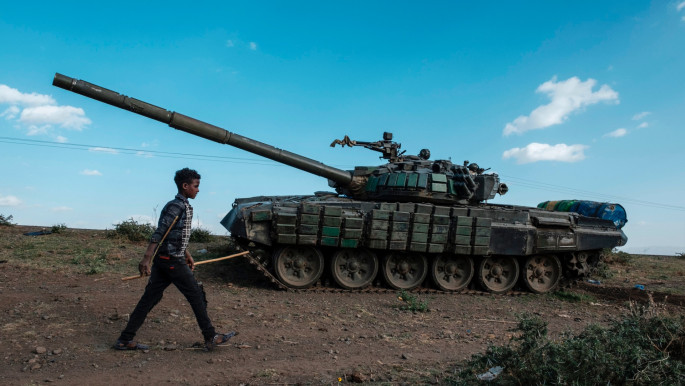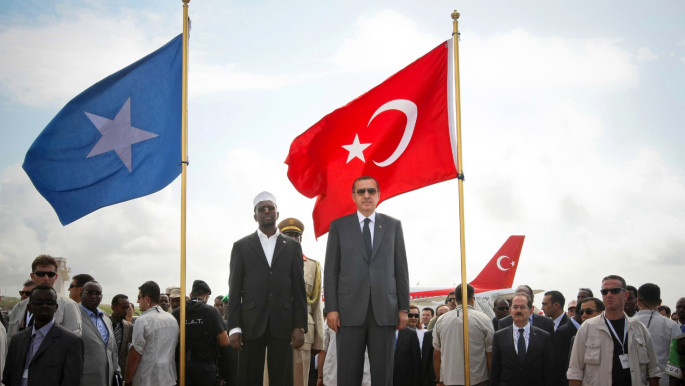Egypt, Sudan and Ethiopia's Nile dam dispute: A looming conflict?
Egypt's President Abdel Fattah el-Sisi on 30 March warned Ethiopia that his country's share of the River Nile's waters is "untouchable," amid a deadlock and stalling talks over Addis Ababa's ongoing dam project on the Nile.
Egyptian, Sudanese, and Ethiopian foreign ministers met in the Democratic Republic of Congo (DRC) over the weekend for four-day talks on the dam dispute.
Before the meetings, Egypt's foreign ministry had warned that the meeting was the "last opportunity" to find an agreement before Ethiopia's second-stage filling. The diplomatic measures, however, struggled to satisfy all three countries' demands.
Egypt's foreign ministry on Tuesday said that the talks had ended without progress. A Congolese mediator, meanwhile, told AFP that Sudan had objected to the terms of a draft communique. "Ethiopia and Egypt accepted the terms contained in the draft final communique. But Sudan felt that its interests in the River Nile were at threat," he said.
Ethiopia has pursued construction of the $4.6 billion Grand Ethiopian Renaissance Dam (GERD) since 2011, which pitted it against both Egypt and Sudan. Cairo and Khartoum have expressed concerns over their own access to the Nile's waters. While these growing tensions also threaten the Horn of Africa's harmony, international mediation efforts have so far proved fruitless.
 |
Ethiopia has pursued construction of the $4.6 billion Grand Ethiopian Renaissance Dam since 2011, with both Cairo and Khartoum expressing concerns over access to the Nile's waters |  |
Sisi himself claimed that the region faces "instability that no one can imagine" if Ethiopia proceeds with the planned second-stage filling of the dam - which is scheduled for this summer due to the seasonal rains - before coming to an agreement. "No one can take a single drop of water from Egypt, and whoever wants to try it, let him try," Sisi added. "No one imagines that it will be far from our capabilities."
After all, Egypt fears that the dam's completion will cut off its own access to the Nile's waters, which meets around 90% of its water needs. Egypt's Irrigation and Water Resources Minister Mohamed Abdel-Aty reiterated these concerns on 28 March, saying the filling of the dam would have dire consequences for Egypt.
 |
|
| Read more: Egypt and Ethiopia's Nile dam: Negotiating in the shadow of disaster? |
Sudan is also concerned that the GERD threatens its Roseires Dam operations, along with the lives of 20 million Sudanese people who depend on the Nile's waters. Talks have repeatedly stalled over the years, as Ethiopia began filling the dam last July, insisting it will not harm Cairo and Khartoum's water access. It also sees the hydroelectric project as crucial for its own economic growth.
In the short term, further diplomatic attempts to solve this crisis may still be on the table. Khartoum on 17 March called for the international community, namely the UN, EU and US, to help negotiate a solution. And despite his recent fiery comments, Sisi in early March called for a binding agreement to appease all sides in the Nile dispute, and also reiterated his support for negotiations over the dam on 5 April, following the latest meeting in DR Congo.
On the other hand, a renewed border dispute between Sudan and Ethiopia has arisen over the al-Fashqa region, adding further complexities to already strained relations. The territory is within Sudan's internationally recognised border, though Ethiopian farmers have settled there and paid taxes to Addis Ababa, causing a decades-long border row.
When Ethiopia became embroiled in a conflict in the autonomous Tigray region last November with the separatist Tigray People's Liberation Front (TPLF), Sudanese troops moved into the disputed border territory that month, seemingly taking advantage of Addis Ababa's diverted attention.
 |
Given Ethiopia's determination to proceed with the filling of the dam, a near-term resolution to the dispute is unlikely |  |
Clashes have erupted between Sudanese troops and ethnic Amhara militias, with a small number of casualties occurring. Though Ethiopia has distanced itself from these militias, it has still condemned Sudan's advances in al-Fashqa and says Sudan's military is unnecessarily stirring a potential conflict.
Though the Sudan-Ethiopia border issue is a less mentioned source of tensions for the Horn of Africa region, it is still a critical one, as worsening relations could also make it harder to find a resolution to Ethiopia's dam dispute. Therefore, the al-Fashqa border dispute is arguably linked to the wider region's stability.
The African Union (AU) has apparently approached Ethiopia with plans to mediate the crisis. Other regional actors, including Turkey, have been tipped to help resolve the dispute between Sudan and Ethiopia.
Additionally, Sudanese sources in late March toldThe New Arab's Arabic-language service, Al Araby Al Jadeed, that the UAE was mediating between Sudan and Ethiopia on the border issue, and Abu Dhabi told Khartoum it was making progress in alleviating tensions with Addis Ababa.
 |
|
| Read more: What will Biden's presidency mean for the Horn of Africa? |
This came after a Sudanese delegation visited Abu Dhabi on 26 February, with Sudanese government spokesperson Hamza Baloul in late March saying Khartoum had accepted Abu Dhabi's help to negotiate the Nile dispute with Ethiopia.
While Egypt may welcome a resolution to the crisis, Egyptian sources also told Al Araby Al Jadeed that Cairo fears it could be excluded from Emirati-led negotiations, with Abu Dhabi seeking to gain the upper hand. "Egypt is concerned that the UAE's moves will end in a technical and bilateral agreement between Sudan and Ethiopia, and exclude it," the sources said.
The UAE could support a peace settlement to secure stability for its own investments and ties with the region. It has brokered past peace deals, such as between Ethiopia and Eritrea in 2018, boosting its diplomatic credentials. Regional actors like Abu Dhabi and Ankara may fill the vacuum that international powers like the UN, EU and US have so far left.
However, the solution that Abu Dhabi could propose may fail to create a unified agreement that could appease all sides, compared to one that international actors could propose, should Cairo feel excluded.
 |
The border crisis between Ethiopia and Sudan may remain as a 'frozen conflict', preventing an effective agreement over the Nile dam |  |
Even if no comprehensive solution is accepted however, it may not lead to conflict, in the short term at least. Despite Sisi's latest comments, he has employed threatening language in the past, including last year when Ethiopia began filling the dam.
And similar to Sisi's threats to take military action in Libya last year, after calling the advancement of Turkish-backed troops towards Sirte a "red line", the Egyptian president's rhetoric could also be designed to ease and divert domestic discontent.
Additionally, Egypt may rather be looking to build stronger diplomatic relations with its adversaries. Cairo has already warmed towards Turkey and Qatar this year and restored diplomatic ties. Donald Trump's departure from the White House, and Joe Biden's new administration, has seemingly forced Egypt to rethink its positions.
 |
|
| Read more: Turkey's growing influence in the Horn of Africa |
After all, Trump justified potential aggression from Cairo, when he said last October that Egypt may "blow up" the dam. Ethiopia also felt that Washington has often supported Cairo's stance, which has made a resolution to the Nile dispute more difficult to achieve. However, with the removal of such supportive messages from the White House, Egypt would likely hesitate to back up its threats in the short term.
Additionally, all three countries are grappling with their own domestic issues. Ethiopia has been afflicted with the conflict in Tigray, while Sudan and Egypt are plagued with economic woes, and have faced increasing protests within the last year.
In the meantime, the ball is clearly in Ethiopia's court. Yet given its determination to proceed with the filling of the dam, a near-term resolution to the dispute is unlikely.
The border crisis between Ethiopia and Sudan may remain as a "frozen conflict," contributing to lasting sour relations between the two countries. This could prolong divisions which may prevent an effective agreement over the Nile dam.
And since the Nile is a critical regional issue, the international community's failure to step up and support a solution could lead to a more fragile situation in the future.
Jonathan Fenton-Harvey is a journalist and researcher who focuses on conflict, geopolitics and humanitarian issues in the Middle East and North Africa
Follow him on Twitter: @jfentonharvey




 Follow the Middle East's top stories in English at The New Arab on Google News
Follow the Middle East's top stories in English at The New Arab on Google News


